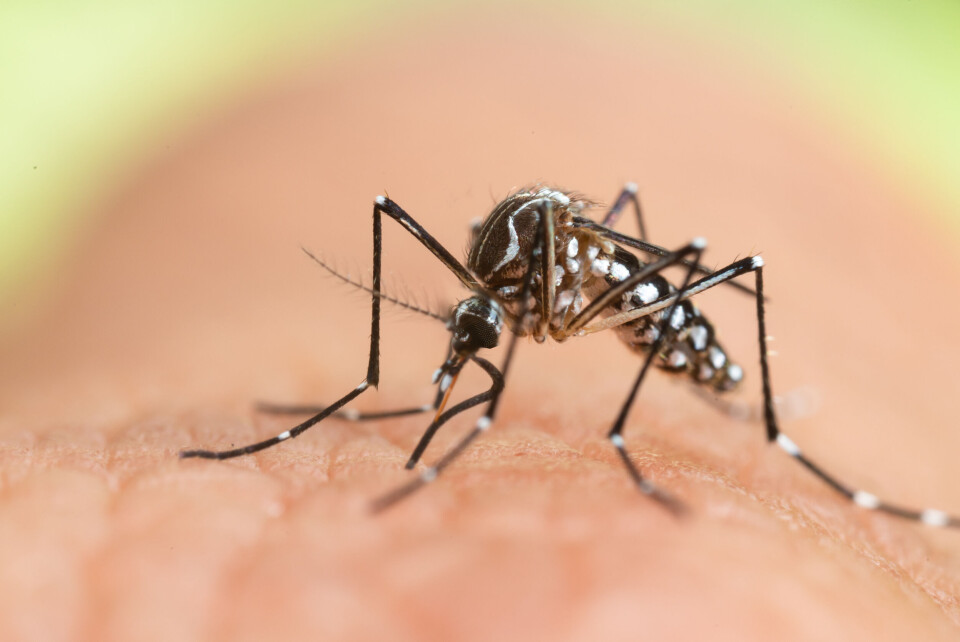-
Chance to see shooting stars tonight from France
NASA says stargazers can expect up to 15 meteors per hour
-
Cars submerged, 1,100 without power: Floods hit south-west France
Three departments are on alert for flooding on Easter Monday after weekend of heavy rain
-
Approval of roadside noise cameras in France will see fines issued against loud vehicles
The devices known as meduses already exist in several cities but so far have only been ‘instructional’
Alarm over massive rise of mosquito-spread diseases caught in France
There were 66 cases of people being infected with the diseases on French soil in 2022. That is more than the previous 11-year period

Fresh figures have caused alarm about the spread of the tiger mosquito in France.
Santé publique France (SPF) said last year saw an “exceptional” rise in diseases linked to the insect that were caught domestically.
Dengue, chikungunya, and Zika are spread by the tiger mosquito, which becomes a carrier (or vector) after they bite an infected person and then bite another. Typically, these diseases are only seen in people who have travelled to a tropical, at-risk country.
However, in recent years, more ‘native’ cases have been reported in France. This means that the cases are detected in people who have not travelled to a usual at-risk country and were instead infected on French soil. These are called transmissions autochtones in French.
There were 66 such cases recorded in 2022, higher than the number for the whole 2010-2021 period when there were 48.
There were 52 cases in the Provence-Alpes-Côte d'Azur region, 12 in Occitanie and two in Corsica.
It was the first time both Occitanie and Corsica had recorded cases where infection had taken place on their territories.
In terms of imported cases, there were 378 cases of dengue fever in 2022, 23 cases of chikungunya and six of Zika.
Read more: Briton infected with dengue fever in France: where are the risk areas?
Read more: France sees surge in indigenous dengue cases as climate warms
Call to raise public awareness
SPF said that while France’s surveillance system is “proving effective”, and has “so far helped to limit the scale of native transmission”, the public must still be “made more aware” of the risk.
The health authority also said that the number of cases in 2022 had put the surveillance system in Provence-Alpes-Côte d'Azur under strain.
Read more: Tiger mosquitoes: How you can help stop their spread in France
It warned that it is “essential to maintain, and even strengthen, the involvement of the various players” in continuing to halt the risk, and said that healthcare professionals need to be “better informed about the risk of indigenous transmission”.
It also said that the public need to be aware of the importance of preventing mosquito bites, and of practices such as removing any stagnant water to prevent more mosquitoes from breeding.
Read more: France’s mosquito season is here. Here are tips on how to avoid them
How can you tell a tiger mosquito from a ‘normal’ mosquito?
Despite their ‘big cat’ name, they are still small (less than 0.5cm in length). Yet, they can be identified by their distinctive black and white ‘striped’ markings, which give them their name.
Unlike ‘normal’ mosquitoes, they are silent and do not make the same buzzing sound.
However, the type of mosquito and the number can vary considerably from region to region, with around 70 different species present in France. Only some of them bite, and most do not carry diseases that affect humans.
How can I avoid getting bitten?
Health authority Anses suggests the following tips to help avoid the insect:
- Regularly empty or remove any stagnant water, including the cups under flower pots, vases, etc., or fill them with sand in order to maintain humidity without stagnant water
- Store buckets, gardening equipment, toys, and other containers away from the rain
- Cover water collection containers with mosquito netting or fabric
- Clean gutters to allow proper drainage
SPF said that people should consult their doctor as soon as possible if they notice any symptoms after receiving mosquito bites, or if returning to France from an at-risk country.
Read also
France warns of increased risk of dengue fever from tiger mosquitoes
Rare case of ‘indigenous’ dengue confirmed in south of France
Mosquito season in France: What influences how prone you are to bites?























